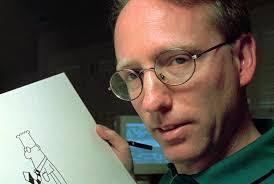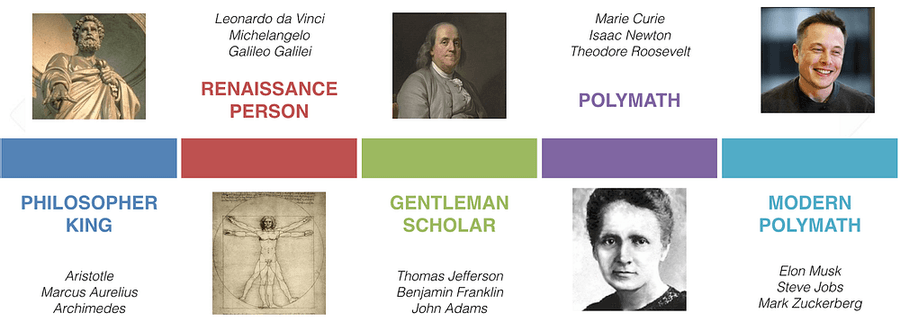People Who Have "Too Many Interests" Are More Likely To Be Successful According To Research
Curated from: medium.com
Ideas, facts & insights covering these topics:
11 ideas
·67K reads
244
3
Explore the World's Best Ideas
Join today and uncover 100+ curated journeys from 50+ topics. Unlock access to our mobile app with extensive features.
The modern polymath
... is someone who becomes competent in at least 3 diverse domains and integrates them into a top 1-percent skill set.
In another words, they bring the best of what humanity has discovered from across fields to help them be more effective in their core field.
Specialists, on the other hand, just focus on knowledge from their own field.
2.1K
13.4K reads
Creating an atypical combination of 2+ skills
Even if you're merely competent in these skills, combining them can lead to a world-class skill set.
Example: Scott Adams, the creator of Dilbert, one of the most popular comic strips of all time, was not the funniest person, not the best cartoonist, and not the most experienced employee. But by combining his humor and illustration skills while focusing on business culture, he became the best in the world in his niche.
1.73K
7.06K reads
Creative breakthroughs
Most creative breakthroughs come via making atypical combinations of skills.
Researcher Brian Uzzi, a professor at the Northwestern University Kellogg School of Management, analyzed more than 26 million scientific papers going back hundreds of years and found that the most impactful papers often have teams with atypical combinations of backgrounds.
1.67K
6.63K reads
Learning new skills
It’s easier and faster than ever to become competent in a new skill. The quality of knowledge in every domain is improving and there is an abundance of free or affordable content from the world’s top experts in every medium you can think of.
Example: 13-year-old Michael Sayman taught himself how to code via Google. One of his mobile games became one of the top 100 apps in the world, beating out Starbucks and Yelp.
1.67K
6.13K reads
It's easier than ever to be a polymath
It's easier than ever to pioneer a new field, industry, or skill set:
- New skill sets, industries, and fields emerge is by combining them with old ones.
- The number of new academic fields and business industries is increasing exponentially.
- As the number of new skills increases, the number of possible combinations increases exponentially. Every new chunk of knowledge can theoretically be combined with every other knowledge chunk. Every new breakthrough creates the potential for exponentially more breakthroughs.
1.64K
4.98K reads
Being a Polymath Future-proofs Your career
A polymath can take the skills that she or he has learned and combine them in new ways quickly to master new fields.
On the other hand, a specialist whose fields becomes obsolete would likely take much more time to adapt to the change and have to start back at the beginning.
1.6K
4.65K reads
Solving complex problems
Being a polymath sets you up to solve more complex problems. Many of the largest problems that face society and individuals benefit from solutions that integrate multiple disciplines.
1.54K
4.5K reads
Standing out in the global economy
The relevance of supply and demand to the job market, to goods and services, to the world of ideas, and to many other places means that you can have the most valuable skill set in the world, but if everyone also has that skill set, then you’re a commodity.
Self-made billionaire Peter Thiel, asks prospective candidates, “What’s the one thing you believe is true that no one else agrees with you on?” This simple question very quickly tells you whether or not you have rare and valuable ideas.
1.64K
3.68K reads
Make Yourself Anti-Fragile
Specialists build up a narrow skill set and reputation and become highly paid for it, but they become fragile as their professions disappear or evolve.
Changes to the environment make polymaths stronger. As new paradigms of business emerge or their passions grow, they can quickly combine their existing skill sets in a myriad of ways.
1.58K
4.43K reads
"Study the science of art. Study the art of science. Develop your senses — especially learn how to see. Realize that everything connects to everything else."
LEONARDO DA VINCI
2.04K
6.06K reads
Famous polymaths
Polymaths have existed forever (they are often the ones who’ve advanced Western civilization more than any others ) but they’ve been called different things throughout history:
Philosopher king: Aristotle, Marcus Aurelius, Archimedes.
Renaissance person: Leonardo Da Vinci, Michelangelo, Galileo Galilei.
Gentleman scholar: Thomas Jefferson, Benjamin Franklin, John Adams.
Polymath: Marie Curie, Isaac Newton, Theodore Roosevelt.
Modern polymath: Elon Musk, Steve Jobs, Mark Zuckerberg.
1.64K
5.4K reads
IDEAS CURATED BY
Alisa Thomas's ideas are part of this journey:
Learn more about personaldevelopment with this collection
Why happiness is the ultimate goal
The importance of creating value
How to create wealth in the modern era
Related collections
Similar ideas
Read & Learn
20x Faster
without
deepstash
with
deepstash
with
deepstash
Personalized microlearning
—
100+ Learning Journeys
—
Access to 200,000+ ideas
—
Access to the mobile app
—
Unlimited idea saving
—
—
Unlimited history
—
—
Unlimited listening to ideas
—
—
Downloading & offline access
—
—
Supercharge your mind with one idea per day
Enter your email and spend 1 minute every day to learn something new.
I agree to receive email updates




